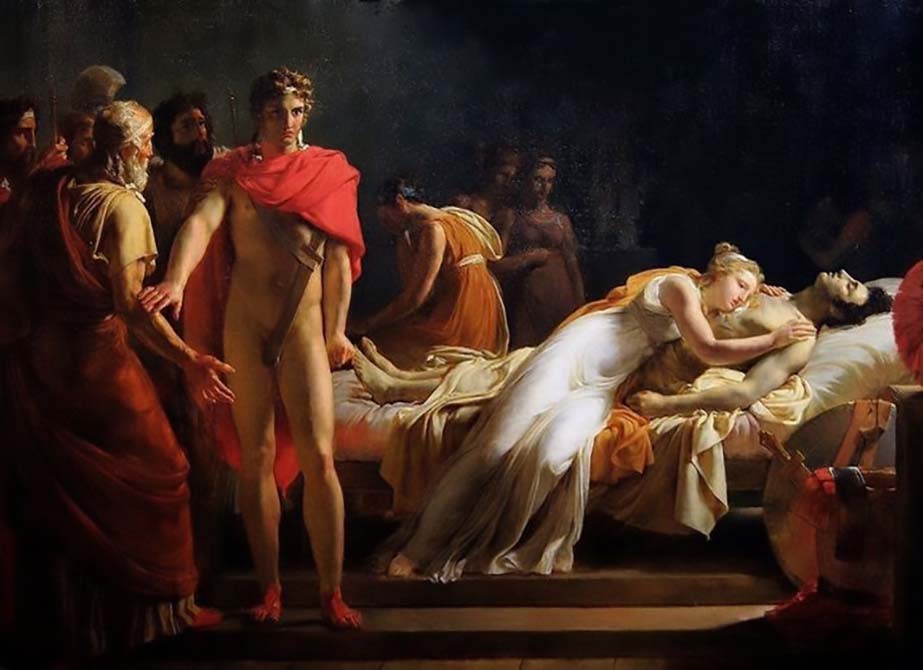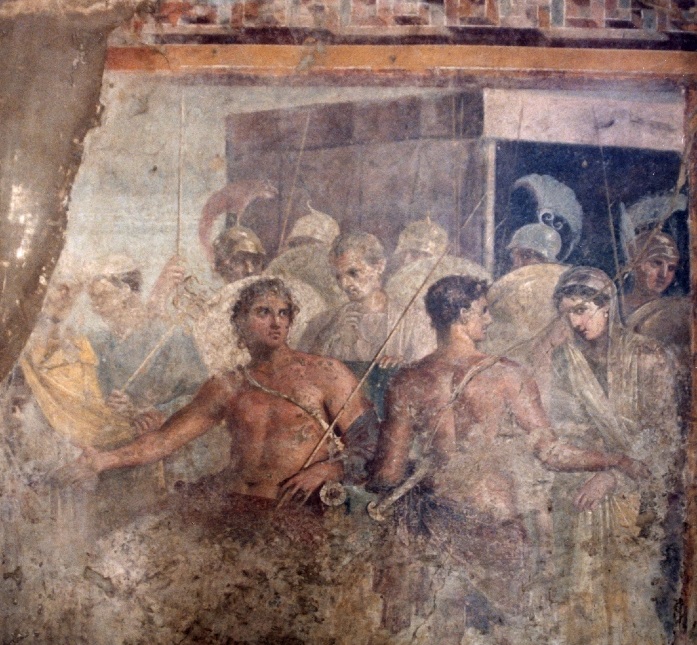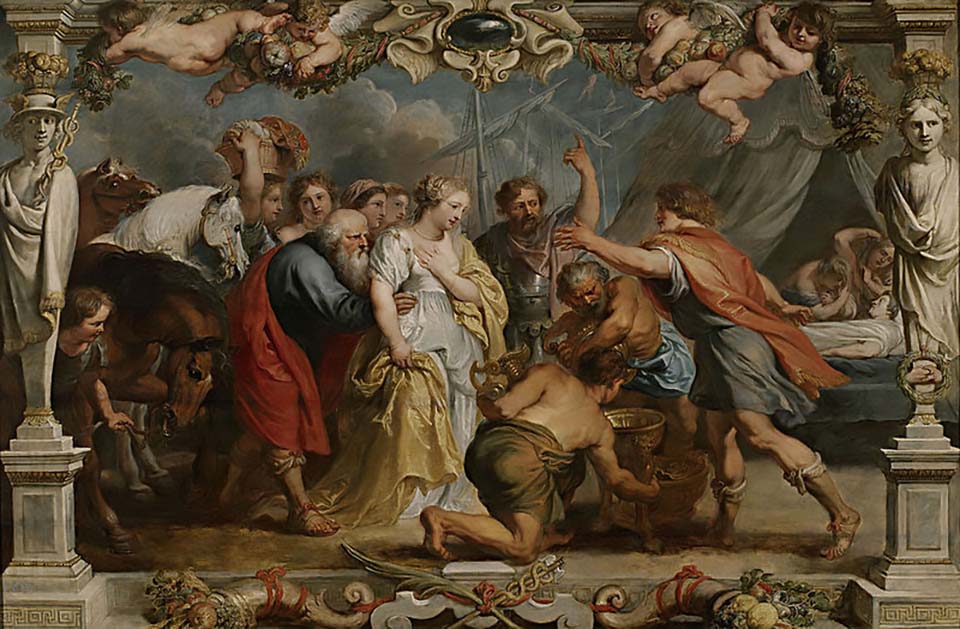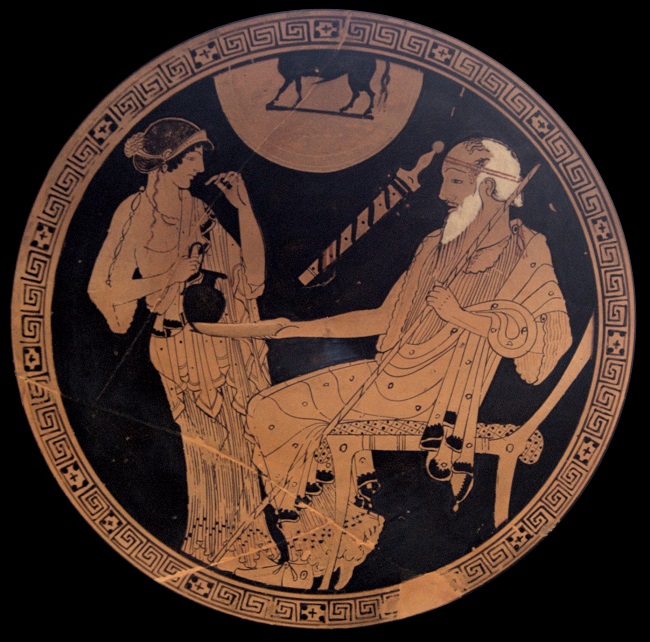Briseis
Brisēís (Ancient Greek: Βρισηΐς, meaning: "daughter of Briseus" - well, she was in fact the daughter of Briseus, by mother unknown), also known as Hippodámeia (Ancient Greek: Ἱπποδάμεια) (1), is a significant character in the Iliad.
Her role as a status symbol is at the heart of the dispute between Achilles and Agamemnon that initiates the plot of Homer's epic. She was married to Mynes, a son of the King of Lyrnessus, until Achilles sacked her city and enslaved her shortly before the events of the poem.
Being forced to give Briseis to Agamemnon, Achilles refused to reenter the battle.
Description
Briseis receives the same minimal physical description as most other minor characters in the Iliad. She is described with the standard metrical epithets that the poet uses to describe a great beauty, though her appearance is left entirely up to the audience's imagination. She was imagined about two millennia later by the Byzantine poet John Tzetzes as:
"tall and white, her hair was black and curly;
she had beautiful breasts and cheeks and nose; she was, also, well - behaved;
her smile was bright, her eyebrows big"

Mythology
According to her mythology, Briseis was the daughter of Briseus, though her mother was unnamed. She had three full brothers who died in the sack of Lyrnessus.
When Achilles led the assault on Lyrnessus during the Trojan War, he captured Briseis and slew her parents and brothers. She was subsequently given to Achilles as a war prize to be his concubine. In the Iliad, as in Mycenaean Greece, captive women like Briseis were slaves and could be traded amongst the warriors.
According to Book 1 of the Iliad, when Agamemnon was compelled by Apollo to give up his own slave, Chryseis, he demanded Briseis as compensation. This prompted a quarrel with Achilles that culminated with Briseis' delivery to Agamemnon and Achilles' protracted withdrawal from battle. His absence had disastrous consequences for the Greeks.
Despite Agamemnon's grand offers of treasure and women, he did not return to the fray until the death of Patroclus.
Achilles was angry at Agamemnon, and seethed with rage in his tent that Agamemnon dared to insult him by stripping him of the prize that had been awarded to him. When Achilles returned to the fighting to avenge Patroclus' death and Agamemnon returned Briseis to him, Agamemnon swore to Achilles that he had never slept with Briseis.

When Odysseus, Ajax, and Phoenix visit Achilles to negotiate her return in book 9, Achilles refers to Briseis as his wife or his bride. He professes to have loved her as much as any man loves his wife, at one point using Menelaus and Helen to complain about the injustice of his 'wife' being taken from him.
This romanticized, domestic view of their relationship contrasts with book 19, in which Briseis herself speaks. As she laments Patroclus' death, she wonders what will happen to her without his intercession on her behalf, saying that Patroclus promised her he would get Achilles to make her his legal wife instead of his slave.
She remained with Achilles until his death, which plunged her into great grief. She soon took it upon herself to prepare Achilles for the afterlife.
This plunged her in even greater grief; for her lover is said to have been an example of gentleness and courtesy: a warrior who never dishonoured the daughters of his foes, as do those who, letting their minds be perverted by war, exercise their cowardice upon the defenceless. That is why Briseis, although a captive, could say before laying her shorn tresses on Achilles' corpse:
"Never on me came anguish like to this—not when my brethren died, my fatherland was wasted—like this anguish for your death! You were my day, my sunlight, my sweet life, my hope of good, my strong defence from harm, dearer than all my beauty—yes, more dear than my lost parents! You were all in all to me, you only, captive though I be. You took from me every bondmaid's task and like a wife you hold me." (Briseis to the dead Achilles. Quintus Smyrnaeus, The Fall of Troy 3.560).
Finally, Briseis was still heard of at the time when Achilles' son Neoptolemus—in her eyes looking like his father—came to Troy. But Neoptolemus, who after the sack of Troy received Hector's wife Andromache, did not take home his father's prize; and Briseis, who once had been the cause of so much trouble, disappeared then from the chronicles.

Sources
1.
From the A scholium at Iliad 1.392 we learn that "[Homer] forms the names [of Briseïs and Chryseis] patronymically. For as other ancient [poets] relate, Chryseis was called Astynome, and Briseis was called Hippodameia." Dictys Cretensis calls Briseis by the latter name in his account of the Trojan War. See Dué 2002: Homeric Variations on a Lament by Briseis 56-58.
Roman, Luke; Roman, Monica (2010). Encyclopedia of Greek and Roman Mythology. Infobase Publishing. p. 105.
John Tzetzes. Antehomerica, 356-358
Iliad 19, 291-95
Iliad 2, 688-94.
Homer. Iliad 19, 261-63.
Iliad 9, 406-20.
Iliad 19, 348-54.
"Wikipedia"













